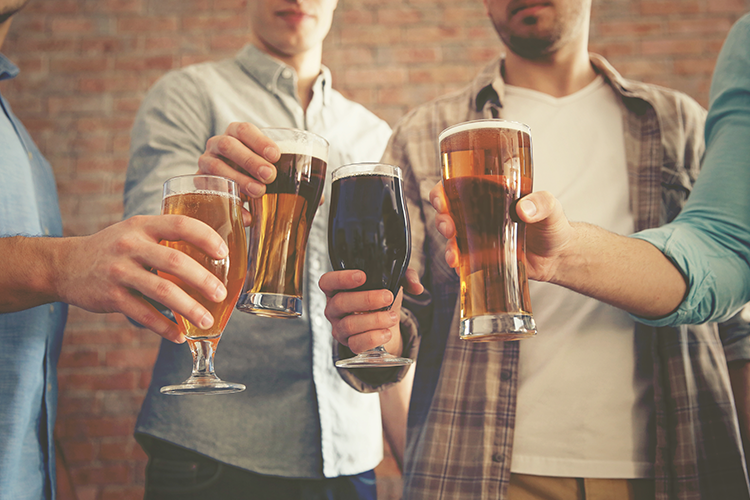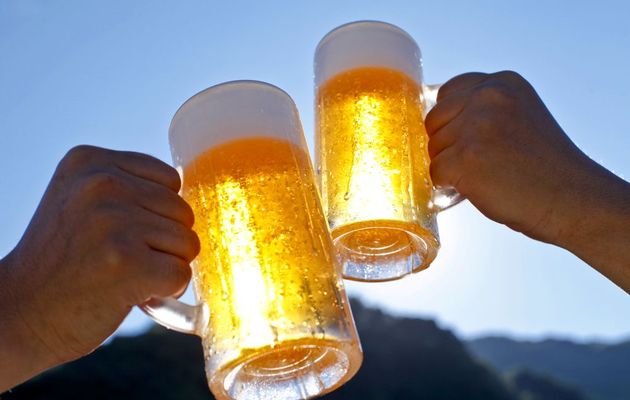Blog
Is low-carb beer better?
Welcome to summer, our southern hemisphere friends, and with it barbecues, donning your togs, and savouring the warm evening breeze. And beer.
Mmm beer.
An ancient and hugely popular alcoholic beverage, beer can be considered to be low in sugar – at least compared to an apple cider, cherry brandy or a can of cola. But that doesn’t mean it contains nothing!
Sugar in beer is mostly in the form of maltose, made up of two glucose units linked together. When digested, maltose is broken down into the glucose units to be used by the body.
Therefore, it is still sugar that can impact blood glucose levels. So ideally, we still don’t want to be consuming it in excess, especially when the sugar is not in its original, natural form, packaged into vegetables, fruit and whole grains alongside fibre and other beneficial nutrients.
But what about low-carb beers? Less carbs means less sugar means better for you, right?
Wrong.
Despite popular belief, low-carb beer is not healthier. Whilst some believe it is less fattening, or it makes them feel less bloated, low-carb varieties contain the similar amounts of alcohol as a full-strength pint of brew, and level of alcohol is something that should be taken into consideration when choosing your drink (for reasons noted below).1
However, they are lower in carbohydrates. A standard beer on average will have 3.1g per 100ml of carbohydrates, compared with the low-carb options in Australia ranging between 0.9-2.1g per 100ml.
So, whether or not you are conscientiously attempting to lower your refined carbohydrate intake, or limit your added sugar consumption to 6 teaspoons (25 grams) per day, here are a few things to consider when enjoying a crisp cool can of beer.
Beer is made from carb-rich grains
Beer is made from carb-rich grains, such as malted wheat, rye, and oats. Yeasts break down the complex sugars supplied by the whole grains in the brewing process, producing the by-product ethanol (a.k.a. alcohol, the stuff that gets us feeling a little woozy).
Blood glucose, carbohydrate, and alcohol
There are ‘lower carb’ beer options, which ultimately will offer less maltose (and glucose) than standard beers. However, alcohol levels remain similar.
Alcohol drinking in excess puts much burden on the body’s detoxification systems, prioritizing this over many other every day body functions. It has been found insulin sensitivity is decreased and the ability to regulate blood glucose is compromised in heavy drinkers, especially those with any pre-existing form of diabetes.2-4 Drinking alcohol may also cause hypoglycaemia (low blood glucose), leading to weariness and feeling light-headed.
Alcohol is alcohol. Period.
Alcohol is high in energy yet nutrient poor, so drinking low-carb beer doesn’t mean one can drink more!
If needing to choose consider the overall impact on health. The liver, kidneys and even the heart are implicated when drinking booze. So drinking a beverage lower in alcohol may be a better option than low-carb.5-6
Drink responsibly
As tempting as it may be to slam it down fast, you can still enjoy a tipple without heavily compromising your health in the process.
But binge drinking or heavy consumption long-term will lead to all kinds of health complications; physically, cognitively, and mentally.6-10
So drink wisely, responsibly, and:
- Keep the drink to a moderate amount – in Australia, this is defined as up to 2 standard drinks for ladies and men daily, and considered be perfectly fine for most people.
- For every alcoholic drink, down a decent sized glass of water.
- Choose low-alcohol alternatives.
- Eat before you drink.
By Angela Johnson (BHSc Nut. Med.)
References:
- Miller, P et. al 2010, ‘The growing popularity of “low-carb” beers: good marketing or community health risk?’, The Medical Journal of Australia, 192 no. 4, pp. 235.
- Drinkaware Trust 2016, Alcohol and Sugar, viewed 30 October 2016, <https://www.drinkaware.co.uk/alcohol-facts/health-effects-of-alcohol/effects-on-the-body/alcohol-and-sugar/>
- Emanuele, NV, Swade, TF, & Emanuele, MA 1998, ‘Consequences of alcohol use in diabetics’, Alcohol Health And Research World, vol. 22, no. 3, pp. 211-219.
- Kim, S & Dai-Jin, K 2012, “Alcoholism and Diabetes Mellitus.” Diabetes & Metabolism Journal, vol. 36, no. 2, pp. 108–115.
- Epstein, M 1997, ‘Alcohol’s impact on kidney function’, Alcohol Health And Research World, vol. 21, no. 1, pp. 84-92.
- NIH n.d., ‘Alcohol’s Effect on the Body’, viewed 30 October 2016, <https://www.niaaa.nih.gov/alcohol-health/alcohols-effects-body>
- Jauhar, S et. al., 2014, ‘Alcohol and cognitive impairment’, BJPsych Advances, 20, no. 5, pp. 304-313.
- Ridley, NJ, Draper, B, & Withall, A 2013, ‘Alcohol-related dementia: an update of the evidence’, Alzheimer’s Research & Therapy, no. 3.
- Wang, J, Fan, Y, Dong, Y, Ma, M, Ma, Y, Dong, Y, Niu, Y, Jiang, Y, Wang, H, Wang, Z, Wu, L, Sun, H, & Cui, C 2016, ‘Alterations in Brain Structure and Functional Connectivity in Alcohol Dependent Patients and Possible Association with Impulsivity’, Plos One, vol. 11, no. 8, p. e0161956.
- Zuccalà, G, Onder, G, Pedone, C, Cesari, M, Landi, F, Bernabei, R, & Cocchi, A 2001, ‘Dose-related impact of alcohol consumption on cognitive function in advanced age: results of a multicenter survey’, Alcoholism: Clinical & Experimental Research, vol. 25, no. 12, pp. 1743-1748.













